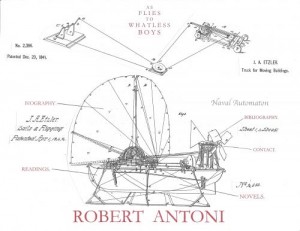When I read “As Flies To Whatless Boys” by Robert Antoni, I was immediately intrigued by the use of different fonts and symbols in the book which is also utilized by Post-Soul writers such as Trey Ellis and Percival Everrett within their novels “Platitudes” and “Erasure”. The inclusion of figures, charts, archival materials, and the denotation of outside accompanying sources all point to the embodiment of Post-Soul themes. Journalist Greg Tate has described the post-soul as “the African American equivalent of post-modernism” and Antoni also displays this in his novel with his use of constructivism. By building on historical knowledge and archival research, Antoni builds a tale by actively constructing new knowledge from his own experiences and his own interactions with the environment. From the beginning of the book, the reader is swept away by in-depth descriptions of Trinidad as well as England. The addition of an accompanying multimedia website “whatlessboys.com” furthers the reader’s involvement by conveying the written text into visual representations. The website theme is also fashioned to look like an aged document itself.
Although it is a work of fiction, I was still able to learn much about the historical background of Trinidad from the novel. Caribbean history is not commonly taught in America classrooms and I was startled by the knowledge that Indian people were brought to the islands as indentured servants after the end of slavery. Information about the Asian and East Indian populations of the Caribbean are not readily accessible and even less so visible in literary works.I was also amused by Antoni’s insertion of himself into the story by the use of email correspondence with the Trinidadian Archive Director Miss Ramsol. Post-Soul writers also enjoy exploring old themes in new ways and I was struck by an uncanny resemblance in this novel to Joseph Conrad’s “Heart of Darkness”. Conrad’s story is about European explorers in Africa and Antoni’s novel has a similarity to it with the abundant descriptions of Willy’s first foray into a tropical and lush foreign locale.
The writing style and the chapter positioning lend an air of timelessness as the plot does not follow a linear format. Instead the reader moves to the present, past, and the future with the mere turn of a page. Also, with the syntax used with the voices of the main characters, multiple races are convincingly represented and portrayed realistically. Ultimately, I have to conclude that it is all of these factors and especially the addition of the accompanying website that elevated the book beyond a normal reading experience to that of a reading adventure.



Even though Antoni’s novel is generally categorize as fiction, there are some very factual elements in there about Trinidad’s history. His description of the island, the people and the events seem so spot on that it makes the reader question the novel’s fictitiousness. An author who is able to write so convincingly is, in my opinion, a extraordinarily creative person. To think up all this fantasy and make it seem so real is quite amazing. Upon meeting Antoni and his quirky persona, I went “Oohhh ok. No wonder!”